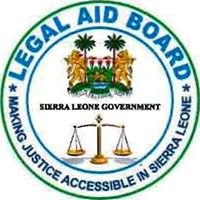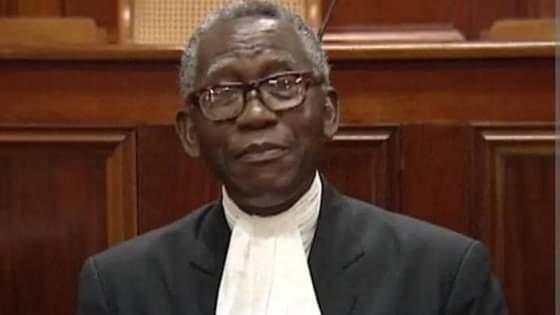Insight into what LAB is doing for children
Since the Legal Aid Board started operations in May 2015, it has amply demonstrated commitment to protecting the rights of children through the provision of legal services, legal education and the introduction of the ‘Child Protection Under the Law’ Programme which focuses on issues of teenage pregnancy, child marriage and harmful cultural practices.
The Legal Aid Act 2012 provides that the Board shall provide legal aid and determine the type of persons and cases for which legal aid may be granted. The draft Legal Aid Guide puts the latter into context. It provides that to qualify for legal aid, the applicant’s monthly income should not exceed five hundred thousand leones (Le500,000) which as you may know is the country’s Minimum Wage.
Nationality is not a criteria for qualification for legal aid. Any resident of Sierra Leone who meets the requirement is provided free legal assistance. Citizens of other Mano River Union Countries, Nigeria and Burkina Faso have benefited from the scheme in the past. The Board in collaboration with the Sierra Leone Drivers Union has gone the extra mile to provide free transportation to the former to their respective countries.
Applicants for legal aid are subject to the ‘Means Test’ to determine qualification for legal assistance. The ‘Means Test’ determines whether the applicant is employed and also looks at income and assets.
The exemption to this requirement are children, the aged and retiree. This means children or better still juveniles accessing the justice system are provided free legal assistance regardless of their income, assets and status of parents.
Children enjoy the added advantage of receiving far more assistance from the scheme than any other group. The Board has a lawyer assigned exclusively to juveniles. As a matter of fact, the Board is the only institution with a full-time Juvenile Lawyer, in the person of Joel Tejan Deen-Tarawally.
The Board prides the caliber of its staff and Lawyer Deen-Tarawally is no exception. He has an advance Law degree in Human Rights and Democratization in Africa. In addition, he has also done advanced human rights courses on Disability Rights in an African Context and Judicial Enforcement of Socio-Economic Rights and Sexual Minority Rights in Africa.
Lawyer Deen-Tarawally believes there have been some modest gains in the Juvenile Justice System in the form of legislations – Child Rights Act 2007, Sexual Offences Act – and the establishment of the Legal Aid Board.
At the same time, he believes the juvenile justice system still fraught with challenges ranging from the failure to set up committees to promote the child justice environment as provided for in the Child Rights Act 2007 to the lack of transportation for juvenile offenders, absence of witness tracing mechanism, improperly constituted juvenile courts in some cases and lack of psychosocial support for children going through the justice system.
The scheme also has Paralegals assigned to juveniles. The paralegals monitor matters involving children in police stations, juvenile homes, formal courts and the informal justice system to ensure the treatment of child suspects is consistent with the law and human rights in terms of legal assistance, bail, detention and support services.
The Board has a consultant, Lawyer Francis Gabbidon who is a legal practitioner of no mean feat having practiced in Sierra Leone for over forty years. He was the first ombudsman. He teaches at the Law Department at Fourah Bay College, University of Sierra Leone. He had taught at the Sierra Leone Law School.
Lawyer Gabbidon sits on Alternative Dispute Resolution matters. His duties include proffering advice on issues of law so that parties have a clear idea of the likely consequences should the matter be referred to the courts. This has benefited children immensely by way of maintenance issues resolved by the ADR.
Against this backdrop, the successes of the Board in the provision of legal services have not come as surprise. The scheme provided legal assistance to two hundred and twenty (220) juveniles around the country by 31 December 2016, which is twenty months into its operations. This includes discharges, acquittals and discharges, committals to High Court, sentences, fines, bail and maintenance orders secured.
Recently, in January 2017 to be precise, the Board intervened in a high profile matter between the Minister of Social Welfare, Gender and Children’s Affairs, Dr. Sylvia Blyden and two children of the Children’s Forum Network (CFN).
The Minister had taken the kids to the New England Police Station rather than hand them over to social workers at the Ministry. The Board’s Juvenile Lawyer, Joel Deen-Tawarally successfully secured bail for the only remaining child suspects after the Board’s Paralegal had secured the release of the other suspect the previous day. Contrary to rumors making the round at the time, the suspect is not related to the Lawyer Deen-Tarawally.
Also, four hundred and seventy-four (474) children benefited from maintenance orders secured by the scheme’s Alternative Dispute Resolution (ADR) services. This has ensured the children continue their education.
During the periods leading to the reopening of schools, the ADR worked overtime to cope with complaints relating to maintenance orders. In August and September 2017, the Board received up to fifty complaints per day from mothers worried that the fathers of their children might renege on their responsibility to provide money for schooling.
The Board has also mediated hundreds of custody matters. There have been cases of fathers refusing to release children to their mothers in time for schooling at the beginning of term. Also, the Board had intervened to ensure fathers have access to their children at regular intervals.
The ADR has reunited feuding families around the country. The one which stands out for me involves a prominent Bishop and his estranged wife and four children. The relationship between the two had degenerated to such an extent that the Man of God had not been on speaking terms with his wife and children for nearly ten years. This was a test case for the Board’s ADR as efforts at mediation by religious leaders and other parties had failed in the past.
Two hundred and eight (208) senior secondary school pupils of the Hill Top Community Secondary School at Hill Station in Freetown make up the largest single group of children to have benefited from the Legal Aid Board at any given time. The pupils had their results released by the West African Examination Council after the intervention of the Board. WAEC had held on to the results because the school authorities had failed to pay the examination fees.
Children have also benefited from the Board’s legal education through school outreach. Children have been educated on the scheme, Child Rights Act 2007, how the justice system works, Rule of Law and Human rights. The Board held outreach events in fifty schools around the country in 2016. A total of four thousand six hundred and sixty-one (4,661) pupils participated in these events. The school outreach programme was unveiled in October 2016.
As the Board expands its operations following the deployment of paralegals in every district in December 2016, monitoring of child rights issues in the informal justice sector including Alternative Dispute Resolution services provided by chiefs and other actors have been stepped-up.
The establishment of Citizens Advisory Bureaus in three Wards in Freetown will continue to impact positively of child rights issues. The Board hopes to establish the Bureaus in all the 394 Wards in the country by the end of the year.
Author Joseph Dumbuya is the Registrar at the Sierra Leone Legal Aid Board
Stay with Sierra Express Media, for your trusted place in news!
© 2017, https:. All rights reserved.







Pingback:Free Legal Aid For Child Custody Cases | Try New and Inovative Ideas to Help Divorce
/